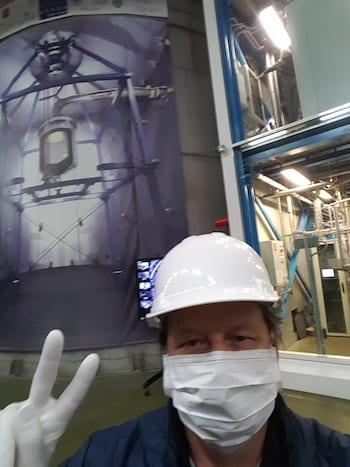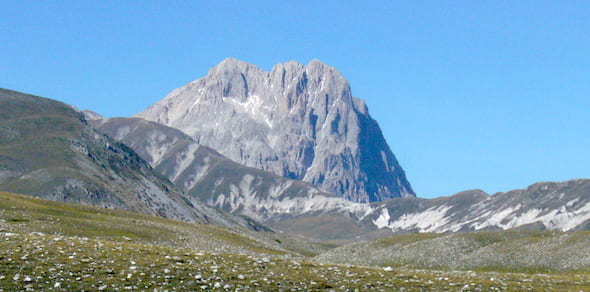Petr Chaguine, Junji Naganoma are keeping experiment to find dark matter on track
It’s hard enough being away from home during the COVID-19 pandemic, but two Rice University researchers find themselves in unusual circumstances.
For much of their days, they’re toiling away underneath a mountain. In Italy.
Petr Chaguine, an assistant research professor of physics and astronomy, and Junji Naganoma, an academic visitor and a researcher with Rice’s Astroparticle team, are part of a skeleton staff overseeing an upgrade to the XENON Experiment, a complex detector built to capture evidence of dark matter in the universe.

Petr Chaguine sends a sign home this week from the XENON Experiment, deep under a mountain in Italy. Photo courtesy of Petr Chaguine
Chaguine has been the experiment’s commissioning manager, living in Italy since January 2019. Naganoma has lived in Italy full time for many years as XENON’s operations manager.
Both remain on station while the massive experiment is reconfigured to become even more sensitive. That requires commuting each day to the facility, the Gran Sasso Laboratory, located deep inside a mountain about 75 miles from Rome, to shield it from as much radioactive interference as possible.
The underground facility is covered by about 4,600 feet of rock in Gran Sasso and Monti della Laga National Park, and is accessed through a six-mile-long freeway tunnel. The lab is in a region that, according to a XENON colleague, has been less affected by COVID-19 than hotspots to the north.
Chaguine, via email, said he’s able to get to his apartment in the nearby small village of Paganica. “The lab does not provide us any shelter,” he said. “According to the most recent Italian government regulations, outside researchers cannot enter the above-ground facility. We are allowed to complete urgent work in the underground laboratory only.”
He said Paganica “looks very empty now.”
“There are almost no people on the streets,” Chaguine wrote. “All people stay home rather than going outside. All bars, restaurants and local shops are closed. Transportation is restricted to the local rides from home to work, to supermarket, to pharmacy or to hospital in case of emergency. It is a new Italian government regulation. Police can stop you and require you to present a special form filled to confirm the purpose of your trip.”
He noted Italian colleagues “are kindly translating news and new government regulations” as they appear, and that the situation in the country changes by the day. Chaguine is able to communicate with his family in Houston, primarily via Skype.
Christopher Tunnell, an assistant professor of physics and astronomy and of computer science and the Rice XENON principal investigator, noted the experiment is in “a fairly busy commissioning phase at the moment.

Gran Sasso Mountain. Photo by maury3001 via Wikipedia
“It means we need to have people coming in from all over the place, which is banned now,” Tunnell said. “It’s an extremely radio-pure (shielded) experiment, and that comes from us being very careful about how the experiment is built, what it interacts with while it’s being built, and taking good care of it once it is built.”
Last year, the Rice team was part of the confirmation by XENON1T of the half-life of Xenon 124, which turned out to be many orders of magnitude longer than the universe.
Tunnell said the detector is in a clean room and in a cryostat that, when operating, keeps the xenon at about minus-96 degrees Celsius. “If you suddenly have a work stoppage, you could store the detector in a way that it will actually damage it, and in the worst case, destroy it,” he said. “The biggest fear we had last week was whether we could we get the experiment in a safe state, and it seems, through the hard work of Petr, Junji and their other collaborators on site, that we were able to do that.
“We can do a complete work stoppage if required,” Tunnell said. “Everybody on site are the eyes, ears, and — more importantly — arms of people who cannot travel, which means we can actually do a fair amount remotely now.”
Chaguine noted the work has keep them busy. “Currently we have eight XENON people at Gran Sasso,” he wrote. “Two students from Zurich University most likely will leave next week. We are adjusting the scheduled work with people available at Gran Sasso. The workload is higher than usual.”
Travel restrictions are likely to keep he and Naganoma in place for the foreseeable future. “Since the situation changing very quickly we currently don’t know how the virus affects our long-term prospective,” he wrote. “We are working on minimizing the negative effect (of a delay or a stop of certain activity) for the XENON experiment.”
Chaguine does have a message for friends and colleagues in Houston.
“First: NO panic!” he wrote. “Second: No panic at all! Third: No panic in ANY situation! Follow Rice Crisis Management recommendations. Minimize the risk of virus spread-out (stop meetings, classes, direct contacts, etc.). Stay safe!”

